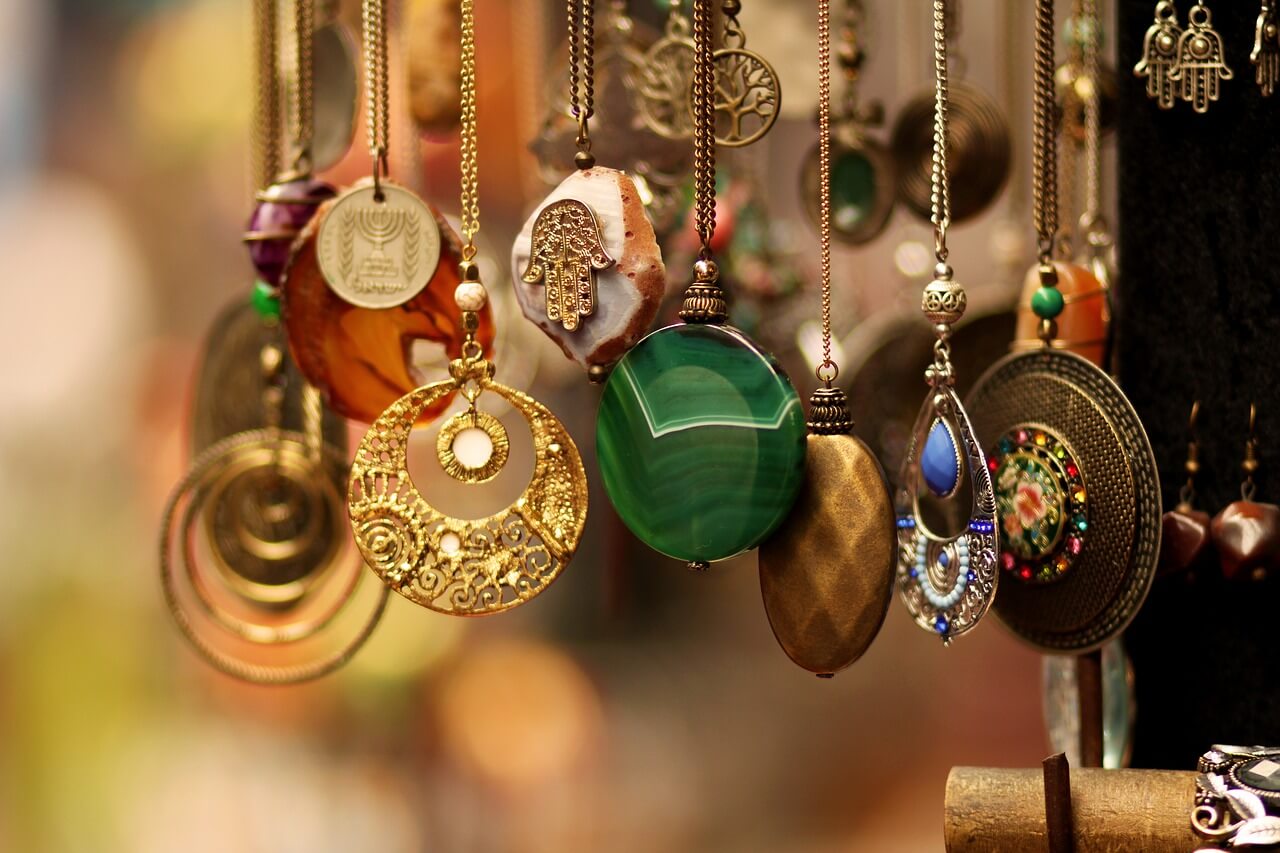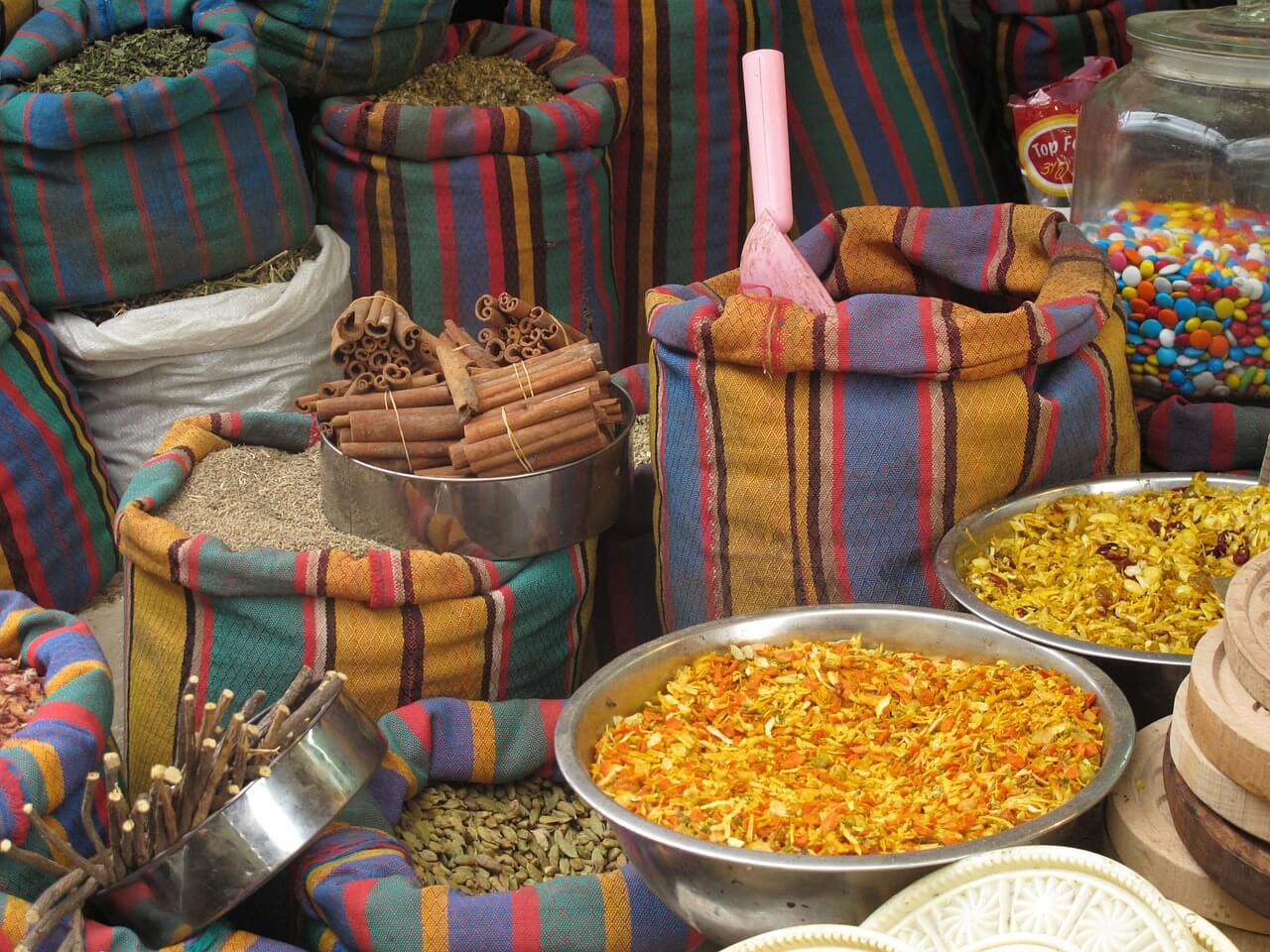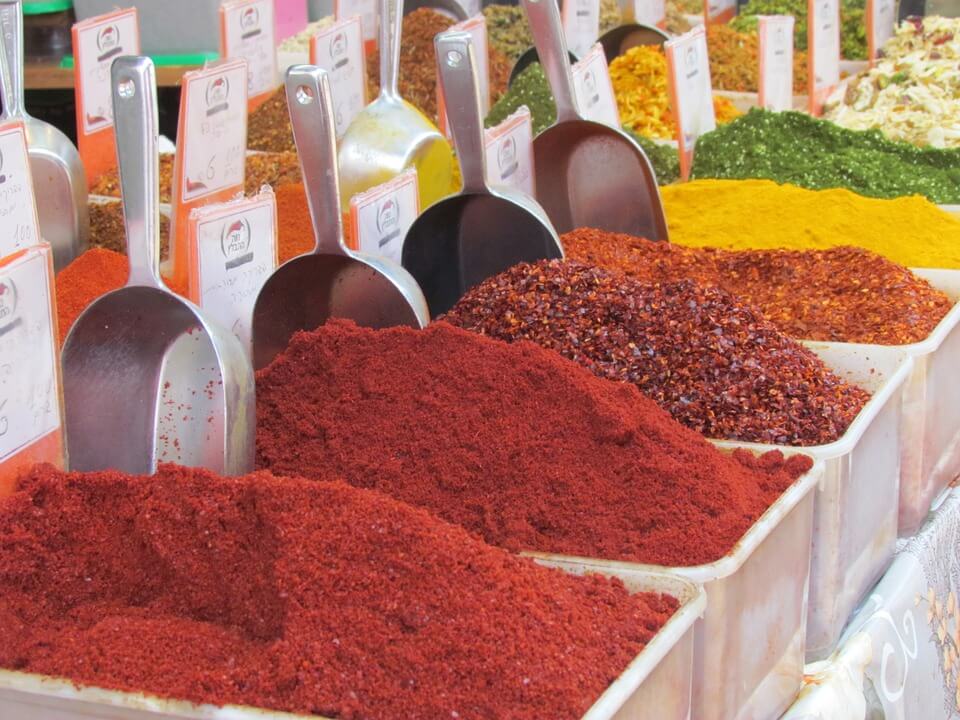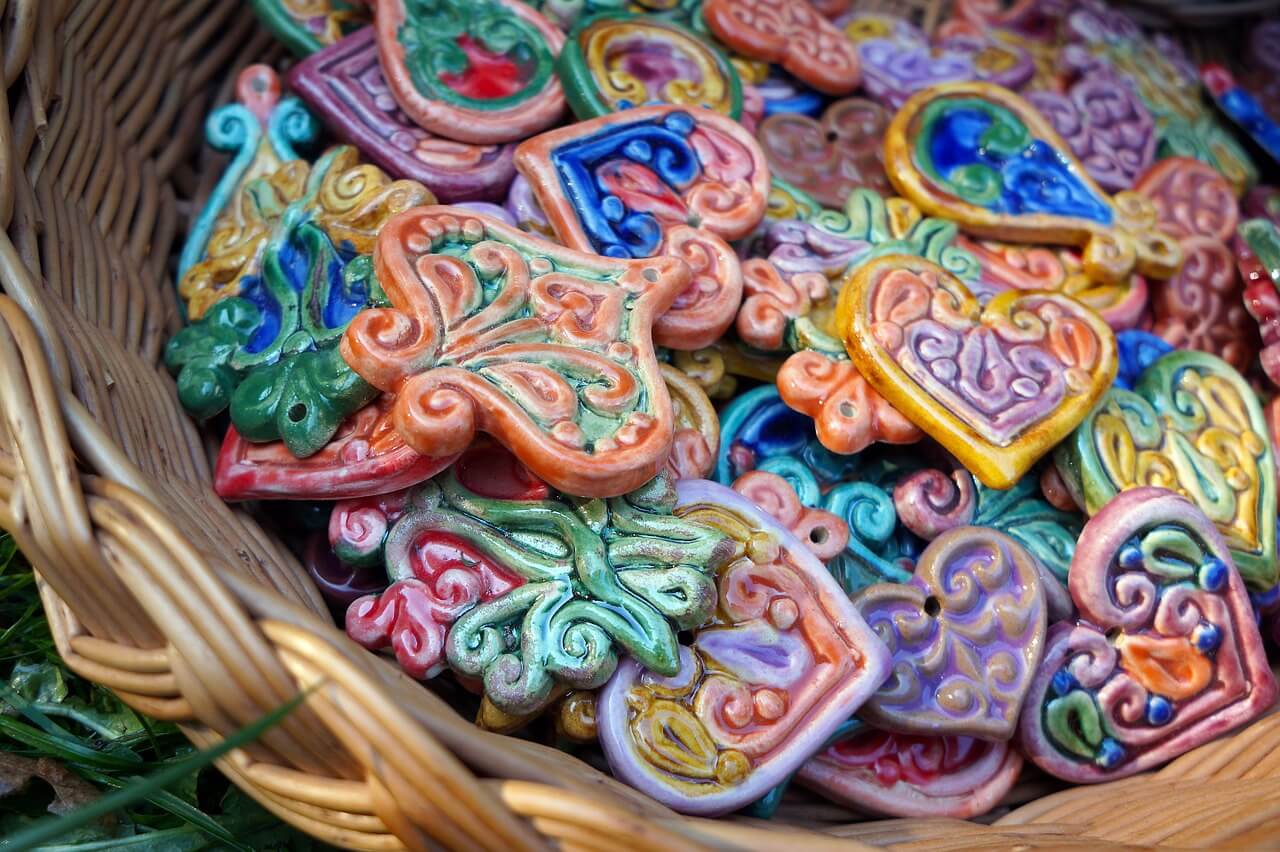Top 10 Israeli Markets
With this list of the best markets (Shuk or bazaar) in Israel you will be able to bargain hunt to your heart’s content as well as get a glimpse into the multi-cultural society of Israel. The colorful people who work and shop in the markets, the aromas, sounds, delicious ethnic foods and unique goods will make your trip to Israel complete.
Mahane Yehuda
Where: Bordered by Agrippas St., Etz Chaim St., Yaffo St. and Beit Yaakov St., Jerusalem
When: Sun-Thurs 8am-7pm, Fri 8am-3pm, Sat closed but some restaurants and cafes open
Jerusalem’s main market covers several streets and includes a wide range of food stalls, clothing and household goods. You will also find many eateries of a high standard here. The market has become a magnet for foodies wanting to try ethnic cuisine from Georgia, Tunisia, Morocco and of course Israeli. Highlights of the market include Uzi Eli’s healthy juice stall, the Georgian restaurant Hachapuria and the freshly baked pastries.
Shuk HaCarmel
Where: HaCarmel Street, Tel Aviv; Magen David Square to Carmalit
When: Sun-Thurs 8am-5-6pm, Fri 8am-3pm, Sat closed
This is Tel Aviv’s main market in the middle of the city. Here you can walk down the long pedestrian street and enjoy fresh produce, clothing, toys, household goods, bakeries, fish mongers, butchers and more. The single street market is adjacent to the more sophisticated Nahalet Benyamin Arts and Crafts Fair which is open Tuesdays 10am-6pm and Fridays 10am-3/4:30pm. Here the artists sell their creations which are all hand-made.
Jaffa Flea Market
Where: Across the streets of Olei Zion, Yehuda Margoza, Beit Eshel and connecting covered alley ways in Jaffa.
When: Sun-Thurs 9am-5pm, Fri 9am-2pm, Sat closed
Jaffa Shuk HaPishpushim (flea market) is a truly unique market. It is located in the streets adjacent to Jaffa’s main thoroughfare where the Clock Tower stands. Here you will find piles and piles of antiques, secondhand goods, clothing, musical instruments, jewelry and more. It is truly a flea market, a place for bargain hunters willing to take their time looking for something special. The market has a number of lanes with antique stalls and trendy eateries as well as narrow covered lanes lined on both sides by small stalls piled high with goods and clothing hanging from the shop entrances. Outside you can see carpets spread out on the street along with antique furniture on display alongside a wild mix of everything including the kitchen sink.
Acre Old City Market
Where: Market Street, Acre Old City
When: Daily until 6pm
The surrounding buildings of this market make it so special. The market is the main thoroughfare of Acre’s Old Crusader City. During the Crusader Era of the 13th century the Market Street led from the Hospitallers Gate in the north along King’s Way (Via Regis) to the port. Follow the narrow lanes from the entrance to the Old City all the way to the sea port. The sides of this pedestrian-only street are lined with stores selling clothing, fresh fish, hookahs, spices, coffee beans, fresh fruit, cheap toys, linen and household goods. The smells and sound of this market are vibrant. You are walking through the ancient city where people still live and come to the market for their daily shopping. The street splits at several points and you should take a look down the streets less traveled to see into traditional courtyard dwellings, see ornate balconies, flowers handing from the windows, washing out to dry and old men sitting playing backgammon as they smoke their hookahs. Try the baklava sweetmeats and taste some of the unusual herbs and spices on offer. Fresh fish is a great dish to try in the many eateries and when you have walked the length of the market and reached the sea why not take a short boat excursion or ride on a horse-drawn carriage. One of the lanes leading off of the main market street is called the Turkish Bazaar and has been restored into a quaint, gentrified row of eateries, arts and crafts stores.
Tel Aviv Port
Where: Hangar 12, Port Tel Aviv
When: Mon-Thurs 8am-8:30pm, Fri 7am-4pm, Sat 8:30am-8pm, food stalls, Kitchen Market and Tapas Bar open daily until 11pm; Farmers’ Market Thursday afternoons and Friday mornings.
Shuk HaNamal bills itself as the House of Culinary Israel it is a sophisticated version of the other city markets. It has a great location in Tel Aviv’s port and was the country’s first covered market and was also the first green commercial building in Israel. The market is driven by a desire to provide fresh, seasonal, quality produces and to educate shoppers about the products they buy. The fresh produce found here is really in another league from other Israeli markets. You will often find the vendors grew the produce or made the cheese, wine or baked goods themselves. There are local and international products, specialty stores, a large number of organic fruits and vegetables, butchers, fish mongers, wine, American style delis, artisan cheese, baked goods, hand-made pasta, olives and a professional cookware stall. Looking down on the indoor market from a gallery is a restaurant, demonstration kitchen and center for cooking workshops. In and around the market are many trendy eateries. A farmers’ market is set up in the adjacent squares on Thursday afternoons and Friday mornings. The Farmers’ Market is part of the slow food trend, defending the biodiversity in the food supply and working with suppliers with high standards in animal treatment and environmental protection. For example there are no plastic bags at this market. On Saturdays from 10am to 6pm there is also an Artists’ and Collectors Fair on the pier of Port Tel Aviv.
Jerusalem Old City Market
Where: From the Damascus Gate Old City Jerusalem down El Wad, Via Dolorosa, Cotton Merchants’ Market and three parallel streets between David St. and Chain St.
When: Sun-Thurs 9am-sundown, Fridays early closing, Sat closed
As you walk through the narrow lanes of Jerusalem’s Old City Muslim and Christian Quarters market you can imagine that these were the streets that Jesus walked. 2000 years ago market stall holders probably stood here hawking their goods in the very same way as today’s vendors. What makes the Old City market even more interesting is that a large portion of it runs along the Via Dolorosa, the route Jesus took as he carried his cross on the way to his crucifixion where the Church of the Holy Sepulchre now stands. The narrow lanes of the market have small open store fronts on both sides. You can find a range of goods including Hebron glassware, religious goods, hand-made brushes, household goods, traditional Arabian clothing, tourist souvenirs, pastries, Armenian ceramics, olive wood objects, handcrafts, brassware, spices and the delicious freshly squeezed fruit juices. Most tours of the Old City follow at least a portion of the market streets. In the Christian Quarter the market place is called Muristan, a distortion of the Persian-Turkish word for hospital as a Crusader hospital once stood here. While in the market you can see the site of the former hospital and the restored Lutheran Church of the Redeemer. Next to the Muristan is the Aftimos Market, an area of bustling streets lined with stores. The Muristan market area dates back to the 2nd century BC. Today the area has been restored and a beautiful fountain stands at the heart of the market, it was constructed to mark the 25th anniversary of the reign of Sultan Abed al-Hamid
Ramla Market
Where: Between Herzl Blvd., Detroit Community St. and Jabotinsky Street, Ramle.
When: Sun-Fri 7am-5pm, on Tuesdays the market closes at noon, Wednesday market 7am-4pm
This is one of the most authentic markets in the country and one of the oldest. It was founded at the end of the Ottoman era, renovated under the British Mandate and has continue working since then. The market has a reputation as one of the cheapest markets in Israel. Vendors use tape recorded sales pitches to call shoppers to their stalls. The market is always loud with hawking vendors and Middle Eastern music. On offer are many diverse products and the area is full of small hole-in-the-wall type eateries. Try the ice cold lemonade at the Limonero stand, buy unusual spices found only here and the ethnic restaurants in the area. On Wednesdays the traveling Ramle-Lod market sets up alongside the regular market on King Solomon Blvd in front of the Grand Mosque. The goods are displayed from make-shift stalls and you can get almost all clothing items for under 20ILS as well as household goods, toys, food, sweets, natural health products, mobile phones, accessories and more. Being somewhat off the tourist route Ramle is a great market to visit where you won’t be among crowds of other tourists.
Rosh Haayin Market
When: Fridays 7:30am- about 3 hours before sundown.
Where: Yehoshu’a Bin Nun st., Rosh Haayin
Rosh Haayin is a city off the usual tourist route. It is in central Israel, about 20min north of Tel Aviv. Rosh Haayin has many residents of Jewish Yemenite decent and the market captures that Middle Eastern feel. In fact this is a good place to buy Yemenite spices and taste Yemenite food like jachnun, Kubana and malauach. You can even find bunches of gat, a leaf traditionally chewed by many Yemenite men. It is a sprawling covered market on an open plot, so no meandering lanes like other Israeli markets. There is always a sense of urgency in the air as the Shabbat approaches and locals are in a hurry to get home with their purchases. The market sells a wide variety of goods including fresh fruit and vegetables and nuts, spices. There are many clothing stalls, underwear, household items, Israeli-style ready-to-eat-foods, toys, linen, shoes and cheap art work. The market has a reputation for its cheap prices although it is not a market for bargaining as the prices are already rock bottom. Try a cup of the lemonade at the market entrance, take a walk down the aisle with fresh herbs to smell the parsley, cilantro and fennel but you’ll really love the clothing sections. Bring cash as the market stalls don’t accept credit cards. This market is a great choice if you want a market frequented by locals rather than tourists.
Bezalel Arts Fair Jerusalem
Where: Bezalel HaKatan St. Near Ben Yehuda St., between Bezalel St. and Shmuel HaNagid, Jerusalem
When: Fridays 10am-4pm
The artIsts of the city sell their creations at this arts and crafts fair. The market has a neighborhood feel and is frequented by trendy hipsters, young families and local residents. The market hasn’t been around for long, it was established in 2009 but is extremely popular. It is similar to the Nahalat Binyamin market in Tel Aviv. On offer are hand-made goods including ceramics, jewelry, hand-painted items, paintings, Judaica, hand-made leather goods, wooden toys, books and chimes among other creations. If you want you can get your hands painted by a henna artist. On one side of the market is the historic former building of Israel’s finest school of arts and design and on the other side are boutiques and sidewalk cafes.
Be’er Sheva Bedouin Market
Where: Derech Habron, Be’er Sheva
When: Thursdays
This is a raw, no-frills market in the southern city of Be’er Sheva. It is held in a vacant plot covered only by awnings. The market is a sprawling mix of make-shift stalls and Bedouin who come to the market to sell their wares. Ten years ago you may have seen camels here and Bedouin women selling piles of herbs spread out on blankets on the ground. It is sometimes referred to as the Camel Market. Today the market has become a little more sophisticated but retains its rural feel. This is a market where you won’t see many tourists. You can find the usual market items as well as rows of fabric, electronic goods, pickles, large bags of spices, toys and make-up. The market will give you a glimpse into the colorful blend of cultures in southern Israel.
 Login / Register
Login / Register
 Contact Us
Contact Us




 Certificate of Excellence
Certificate of Excellence Guaranteed Departure
Guaranteed Departure Low Prices Guaranteed
Low Prices Guaranteed 24/7 Support
24/7 Support




